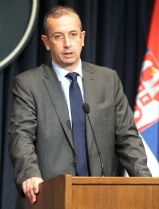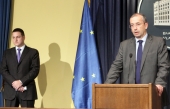Q:
A:
Serbia enters new phase in relations with EU
Belgrade,
17 October 2013
Minister without portfolio responsible for European integration Branko Ruzic stated today that the latest Report on Serbia’s progress towards the EU, prepared by the European Commission, is very positive in the segments that are of major importance for the process of European integration.
Speaking at a press conference at the Serbian government held after the meeting with ambassadors of EU countries dedicated to the presentation of the Report, Ruzic noted that the objections laid out in the Report can only be beneficial to the continuation of reforms.
The Minister announced that meetings with ambassadors of EU countries will become regular because that will help Serbia reach EU membership more efficiently.
Ruzic underlined that when it comes to the screening, i.e. verification of the harmonisation of Serbian regulations with the European ones, the Serbian government has demonstrated with its administrative capacity and professionalism that it is ready and well-trained to manage this process in an efficient way.
He stated that the Negotiating framework for Serbia was discussed at the meeting, which should be completed by 20 December so that the first intergovernmental conference could be held in January 2014 at the latest.
The Minister announced that meetings with ambassadors of EU countries will become regular because that will help Serbia reach EU membership more efficiently.
Ruzic underlined that when it comes to the screening, i.e. verification of the harmonisation of Serbian regulations with the European ones, the Serbian government has demonstrated with its administrative capacity and professionalism that it is ready and well-trained to manage this process in an efficient way.
He stated that the Negotiating framework for Serbia was discussed at the meeting, which should be completed by 20 December so that the first intergovernmental conference could be held in January 2014 at the latest.
Head of the EU Delegation to Serbia Michael Davenport announced that EU ambassadors will speak with representatives of the economy and civil society in Serbia about the annual report of the European Commission in order to present them the content of the document, but also strategies and action plans which the entire society has to implement.
Davenport stated that Serbia has entered a new phase in relations with the EU and that he is impressed with the determination and preparedness of Serbian experts who are taking part in technical meetings.
Ruzic said that the agreement on the import of cigarettes from Croatia at lower tariffs will not put Serbia in a degrading position, but will give an extra opportunity to Serbian exporters.
He said that the Serbian government’s Coordinating body for the EU accession decided yesterday to make an adaptation of all 88 tariff lines.
According to him, the local market absorbs between 21,000 and 22,000 tons of cigarettes, and the quota of 1,625 tons does not apply to Croatia only, but to the entire EU, and the consumption of imported cigarettes outside that quota will be cleared through the customs at the rate of 58%.
The Minister explained that the issue concerns the annual quota of 1,625 tons of cigarettes from the Tvornica duhana Rovinj, which are cleared at the rate of only 15% on the basis of the CEFTA agreement, which is almost four times less than in the case of cigarettes from other European countries, which are cleared at the rate of 57%.
Recalling that the system of exports has functioned in this way in the last six years, he said that the export of cigarettes from Serbia to EU countries, including Croatia, will not be cleared, i.e. it will be cleared at the tariff rate of 0%.
He reiterated that this is a great opportunity for Serbian businessmen.
Ruzic added that Serbia has received assurances from Brussels that some non-tariff barriers that have existed so far in Croatia, will not be possible anymore as Croatia is now a member of the EU and has to apply its standards.
The question of the quota of imported cigarettes is not a bilateral issue. It is discussed with the European Commission and not with individual member states, Ruzic concluded.
Davenport stated that Serbia has entered a new phase in relations with the EU and that he is impressed with the determination and preparedness of Serbian experts who are taking part in technical meetings.
Ruzic said that the agreement on the import of cigarettes from Croatia at lower tariffs will not put Serbia in a degrading position, but will give an extra opportunity to Serbian exporters.
He said that the Serbian government’s Coordinating body for the EU accession decided yesterday to make an adaptation of all 88 tariff lines.
According to him, the local market absorbs between 21,000 and 22,000 tons of cigarettes, and the quota of 1,625 tons does not apply to Croatia only, but to the entire EU, and the consumption of imported cigarettes outside that quota will be cleared through the customs at the rate of 58%.
The Minister explained that the issue concerns the annual quota of 1,625 tons of cigarettes from the Tvornica duhana Rovinj, which are cleared at the rate of only 15% on the basis of the CEFTA agreement, which is almost four times less than in the case of cigarettes from other European countries, which are cleared at the rate of 57%.
Recalling that the system of exports has functioned in this way in the last six years, he said that the export of cigarettes from Serbia to EU countries, including Croatia, will not be cleared, i.e. it will be cleared at the tariff rate of 0%.
He reiterated that this is a great opportunity for Serbian businessmen.
Ruzic added that Serbia has received assurances from Brussels that some non-tariff barriers that have existed so far in Croatia, will not be possible anymore as Croatia is now a member of the EU and has to apply its standards.
The question of the quota of imported cigarettes is not a bilateral issue. It is discussed with the European Commission and not with individual member states, Ruzic concluded.













